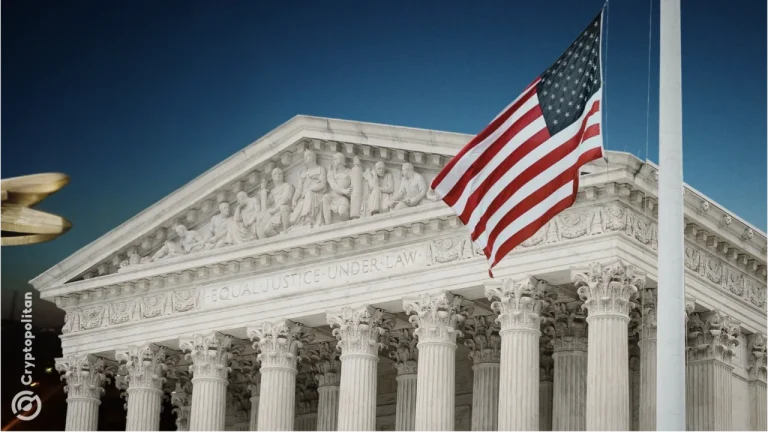Main Highlights
- US prosecutors are opposing efforts to introduce cryptocurrency policy debates into the criminal trial of two brothers accused of exploiting Ethereum’s MEV bots to steal $25 million.
- Federal authorities argue that a third-party amicus brief could improperly influence the jury and that digital asset policy discussions belong in Congress, not in a courtroom.
- The defense contends that the government’s honest validator theory is a new and untested legal argument that could criminalize normal blockchain operations due to Ethereum’s decentralized nature.
- The brothers’ legal team is pushing for the court to consider a brief from crypto advocacy group Coin Center, arguing its expertise is crucial for understanding the implications of the government’s theory.
- Prosecutors want to limit the testimony of a Flashbots researcher, fearing it might include subjective interpretations of Ethereum’s rules rather than purely technical details.
Prosecutors Oppose Crypto Policy Arguments in $25M MEV Trial
US prosecutors have officially stated their opposition to introducing cryptocurrency policy discussions into the criminal proceedings against two brothers accused of illicitly siphoning $25 million using Ethereum’s maximal extractable value (MEV) bots. The legal team representing the government filed a plea with the US District Court for the Southern District of New York, urging Judge Jessica Clarke to dismiss a proposed amicus curiae brief submitted by a third party. This brief aimed to offer guidance on the case.

The prosecution’s concern is that this external document could unduly sway the jury’s verdict in favor of Anton and James Peraire-Bueno, sons of Jaime Peraire, who formerly led MIT’s department of aeronautics and astronautics. The amicus brief, reportedly from cryptocurrency advocacy group Coin Center, sought to question the government’s core fraud argument, known as the honest validator theory.
Amicus Brief Deemed Unhelpful by Prosecutors
In their argument presented to Judge Jessica Clarke, federal prosecutors characterized the proposed amicus submission as inappropriate, unhelpful to the Court, and an invitation for nullification. They emphasized that matters concerning digital asset policy should be addressed by legislative bodies like Congress, not by a jury in a criminal trial. Prosecutors explicitly stated that a brief focusing on policy arguments related to the role of validators within the cryptocurrency industry is not relevant to the established legal standards governing the case.
The Department of Justice had indicted the Peraire-Bueno brothers, aged 24 and 28, in May of the previous year. The indictment alleged that they exploited a software vulnerability within Ethereum’s automated trading bots. Prosecutors claim the brothers manipulated transaction orders, which allowed them to divert approximately $25 million in cryptocurrency within a mere 12 seconds.
Defense Challenges Government’s Honest Validator Theory
The defense attorneys representing the Peraire-Bueno brothers have accused the government of introducing a novel and potentially problematic fraud theory. They argue that this theory fundamentally disputes the established operational norms of blockchain users without providing adequate clarification. Specifically, the defense contends that under the government’s honest validator theory, any participant acting competitively within the Ethereum network could potentially face federal charges simply for deviating from the blockchain’s standard specifications.
Lawyers Daniel Nathan Marx and William Fick referenced a 2008 Second Circuit case, United States v. Finnerty, to support their claims that the prosecution is overstepping established precedent.
The defense is also urging Judge Clarke to permit Coin Center’s participation in the proceedings. They believe the organization’s specialized knowledge is essential for a proper understanding of the ramifications of the government’s proposed legal theory. Marx and Fick stated that the government’s outright opposition to the submission falls within the Court’s discretion to allow and consider such input.
Coin Center, a policy-focused organization based in Washington, has not been officially named in the court filings. However, references within the defense’s correspondence strongly suggest their involvement in preparing the amicus brief. The defense insists that Coin Center’s objective is not to influence the jury but rather to clarify how the government’s new legal theory could alter the interpretation of blockchain activities extending beyond this specific case.
In support of their legal arguments, the defense attorneys cited other court cases, including one presided over by Judge Failla in United States v. Storm, which previously allowed limited amicus participation during the jury instruction phase.
Ethereum’s Decentralization and the Hot Validator Theory Dispute
The defense team contends that the decentralized architecture of the Ethereum network inherently undermines the government’s fraud claim. According to Marx and Fick, the Ethereum blockchain lacks a singular central authority, and its market participants are primarily driven by economic incentives rather than by enforceable agreements or promises. They argue that if these incentives fail to prevent exploitation, it represents a systemic issue rather than criminal conduct.
The defense lawyers reportedly stated, The Ethereum network functions through independent actors following incentive structures, not contractual obligations. They further argue that because no promise to the victim was made, the fraud statute, as currently applied, does not fit the situation.
Earlier in October, the defense counsel also submitted a letter requesting Judge Clarke to restrict the testimony of Bert Miller, a researcher at Flashbots, to strictly technical matters. Flashbots is a developer within the MEV ecosystem that prosecutors intend to use as an expert witness to explain the alleged exploit. The Peraire-Bueno brothers’ lawyers are arguing against allowing Miller to interpret or comment on the supposed rules governing Ethereum or the expectations for honest validators, asserting that such commentary would be too subjective and policy-driven rather than fact-based.
Expert Summary
US prosecutors are actively working to prevent cryptocurrency policy discussions from entering the criminal trial of two brothers accused of a $25 million Ethereum MEV bot scheme. The prosecution argues that such policy debates are inappropriate for jury deliberation and belong in legislative arenas. Meanwhile, the defense is attempting to introduce expert testimony and arguments suggesting the government’s fraud theory is flawed and potentially criminalizes normal blockchain behavior on a decentralized network like Ethereum.

